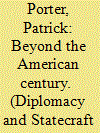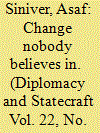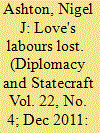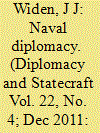|
|
|
Sort Order |
|
|
|
Items / Page
|
|
|
|
|
|
|
| Srl | Item |
| 1 |
ID:
108882


|
|
|
|
|
| Publication |
2011.
|
| Summary/Abstract |
As the United States became a world Power, journalist and intellectual Walter Lippmann feared that it would become its own worst enemy. During and after the Second World War, he tried to steer the country towards coherent statecraft, to define the national interest and the limits of power, and give geopolitical expression to the role of the United States as the core of an Atlantic strategic system. But in response to world war, the Truman Doctrine, and the Korean War, he became pessimistic about the country's ability to conduct strategy effectively. In the prophetic tradition, he believed that a fatal symbiosis between America's growing strength and domestic politics led it towards crisis. Though at times ahistorical, Lippmann's concept of strategy deserves attention for its dialogue between power and identity, for its questioning of "ends" as well as means, and for its focus on the danger of self-defeating behaviour.
|
|
|
|
|
|
|
|
|
|
|
|
|
|
|
|
| 2 |
ID:
108888


|
|
|
|
|
| Publication |
2011.
|
| Summary/Abstract |
Despite the promise of 'change' in President Barack Obama's early dealings with the Israeli-Palestinian conflict, the policy that has since emanated from the White House was in fact commensurate with those of preceding administrations. Rather than heralding a new direction for American engagement with the conflict, the Obama Administration had displayed more patterns of continuity than change in its dealings with both parties. Specifically, by continuing to act as "Israel's attorney" during negotiations, the Obama team had in effect negated the president's early pledges to act as an honest broker in the conflict. In assessing the (in)effectiveness of the Administration's management of the Israeli-Palestinian issue, it seems that on-going mediation efforts to revive the moribund peace process have exhausted their potential. Arbitration may be explored as a more effective method to resolve the Israeli-Palestinian territorial dispute.
|
|
|
|
|
|
|
|
|
|
|
|
|
|
|
|
| 3 |
ID:
108884


|
|
|
|
|
| Publication |
2011.
|
| Summary/Abstract |
The general historiography of United States-African relations in the 1960s holds that the policies of Lyndon Johnson towards this continent were a failure. Johnson, most historians suggest, generally ignored Africa and, in doing so, squandered the good feelings that many Africans had developed towards his more charming and polished predecessor. However, such views do a disservice to the Johnson Administration, which in fact embarked on a quiet African programme rooted in American cultural and economic power, and which proved to be more successful than is generally believed. Two factors lay at the heart of Johnson's decision to rely on a soft power policy in Africa: the domestic political constraints of the civil rights movement at home; and the belief in modernisation theory that had emerged as a guiding principle for many of his advisors. Johnson, to put it simply, may have lacked his predecessor's style but he compensated with a substantive and imaginative policy that quietly produced a superior method of advancing both American and African interests.
|
|
|
|
|
|
|
|
|
|
|
|
|
|
|
|
| 4 |
ID:
108886


|
|
|
|
|
| Publication |
2011.
|
| Summary/Abstract |
The United States and four other major Western states pursued "Contact Group" diplomacy in trying to resolve the conflict in Namibia from 1977 to 1982-1983. This analysis examines their joint mediation, paying particular attention to the efficacy and constraints of the four principal mediating strategies. First, to mediate collectively helped the Western states in terms of credibility and influence as well as burden sharing and innovation, but it posed the problems of intragroup co-ordination and division. Second, working through the United Nations made the Contact Group a legitimate and credible mediator, whilst the organisation's decolonisation agenda called the mediator's neutrality into question. Third, the Western states managed to enhance their leverage by compounding within the group or borrowing from outside although the extent of such enhancement was limited. Lastly, the Group's record on the carrot-and-stick strategy towards South Africa was also mixed, with a great impact on its performance.
|
|
|
|
|
|
|
|
|
|
|
|
|
|
|
|
| 5 |
ID:
108887


|
|
|
|
|
| Publication |
2011.
|
| Summary/Abstract |
Relations between Britain and Jordan underwent a revival during the premiership of Margaret Thatcher between 1979 and 1990. Although no longer the dominant power in the Middle East, Britain's membership of the European Economic Community and the close relations between Prime Minister Thatcher and President Reagan meant that Britain was seen by King Hussein as an influential power to be courted. Thatcher shared Hussein's views about the Arab-Israeli peace process and lent him strong support as the voice of Arab moderation. She also sought to use her personal relationship with Hussein as a vehicle to further British interests, particularly through her promotion of British arms sales, both directly to Jordan, and indirectly, through Jordan, to Iraq. This article makes use of a large body of British official documents secured under the Freedom of Information Act and Jordanian documents from the Royal Hashemite Archive in Amman to illuminate the development of bilateral relations over the course of the decade. It concludes by showing how the differing responses of Thatcher and Hussein to the Iraqi invasion of Kuwait in August 1990 ruptured their relations. Drawing on sources which have previously been unavailable the article offers a fresh perspective on important aspects of the international history of the Middle East during the 1980s.
|
|
|
|
|
|
|
|
|
|
|
|
|
|
|
|
| 6 |
ID:
108890


|
|
|
|
|
| Publication |
2011.
|
| Summary/Abstract |
This article considers theoretical aspects of the non-belligerent and political use of naval forces, commonly described as naval diplomacy. It presents four arguments. Firstly, it criticises the often used term "gunboat diplomacy" for being too narrow, emotionally charged, and burdened by colonialism. Secondly, the theories on naval diplomacy are criticised for being better suited for doctrinal purposes than for analytical purposes. Thirdly, criticism is levelled against the term "naval presence," which is deemed insufficient as a focal point in a theory of naval diplomacy. Fourthly, elements of a workable theory of naval diplomacy are presented, including the political aim, naval means, diplomatic method, and geopolitical context. In conclusion, warships and navies are described as symbols of national sovereignty and power, and for having, not only a defence value, but also a symbolic, supportive, and coercive value.
|
|
|
|
|
|
|
|
|
|
|
|
|
|
|
|
| 7 |
ID:
108889


|
|
|
|
|
| Publication |
2011.
|
| Summary/Abstract |
Diplomacy is an institution that has undergone tremendous change over the last century-not least in relation to the new, supranational institutions of the European Community/European Union. Nonetheless, it is only very recently that political scientists and historians have taken an interest in the changes brought about by European integration processes for diplomatic norms, roles, and practices. This article investigates the background for this late and limited interest. It does so by comparing and contrasting dominant theoretical trends that have shaped research on European diplomacy in the two disciplines since the Second World War. Against this background it briefly evaluates the recent surge in research on diplomacy and the European Union within political science, and it points to possible avenues for further, joint, research combining the transnational and sociological approaches adopted by political scientists with the attention to temporality and national specificities characteristic of historians' dealings with European diplomacy.
|
|
|
|
|
|
|
|
|
|
|
|
|
|
|
|
| 8 |
ID:
108885


|
|
|
|
|
| Publication |
2011.
|
| Summary/Abstract |
During the Vietnam War there were high expectations from the Johnson and Nixon Administrations for Japan and Britain to provide practical and political support for American military and strategic objectives in Indochina. The leader of Japan's conservative Liberal Democratic Party, Sato Eisaku, and the British Labour Party's Harold Wilson, balanced political support for the United States with significant public pressure at home to eschew any entanglement in the highly unpopular conflict. As junior allies of the United States both Sato and Wilson did not want to see the United States fail in Vietnam or the communist sphere expand in Southeast Asia. Both leaders accrued significant foreign policy advantages as a result of politically and publicly supporting American actions in Vietnam. But to placate domestic electorates that clearly felt uncomfortable over their governments providing explicit, albeit non-military, support to the United States in Vietnam, Sato and Wilson expended substantial prime ministerial diplomacy in attempting to play a mediatory role in the conflict. Each was highly successful in balancing domestic and American demands, whilst maintaining their security partnerships with the United States.
|
|
|
|
|
|
|
|
|
|
|
|
|
|
|
|
|
|
|
|
|